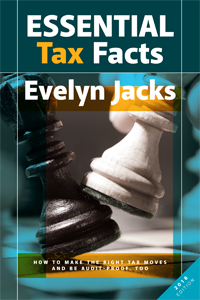Get Ready for 2019: Six Great Tax Moves and Audit-Busters

Gift the gift of knowledge throughout 2019! Make increasing your clients’ tax literacy your 2019 new year’s resolution, and share these essential tax moves and audit-busters that will help them in their dealings with the CRA next year.
These tax tips have been excerpted from Evelyn Jacks’ Essential Tax Facts: How to Make the Right Moves and Be Audit-Proof, Too, which has been fully updated with the information your clients need to know when filing their 2018 taxes. It’s not too late to give Canadians the gift of financial literacy this holiday season – and shipping is free!
Game-Day Tax Strategies
-
Be sure to adjust your prior filed returns for errors or omissions before the end of the year, especially if you suspect CRA owes you money. Remember, the 2008 tax year is statute-barred as of January 1 so you’ll leave money
 on the table forever if you miss this opportunity.
on the table forever if you miss this opportunity.
-
Plan your income sources: Earning a variety of different income sources with different tax attributes can help you to “average down” the taxes you pay.
-
Time your income receipts. Before you pull out that extra $5000 from your RRIF to surprise your spouse with a vacation for Christmas, consider doing so in January instead. This tactic will postpone income taxation until the 2019 tax year. Do the opposite if income will be higher next year.
-
Don’t skimp on your RRSP contribution: An RRSP contribution will increase your tax credits and your after-tax cash flow, too, because it will help you reduce clawbacks of important social benefits you’ll receive all year long.
-
Top up your RESP contributions: It’s a gift that will generate a Canada Education Savings Grant for you, which will embellish on education savings opportunities for your family.
-
File family tax returns together: Because many credits are based on “family” rather than “individual” net income, you and your spouse need to file tax returns together. It’s a smart start to the new year to focus on family tax planning. Hunting down and organizing receipts early can really help, to avoid the annual tax filing panic. Spend some time getting organized over the holidays if you can.
Tax Tools of the Trade
-
Own a private corporation? File a T2 corporate tax return and pay attention to the new Tax on Split Income rules for adults starting in 2018. As well, inquire about the new rules regarding passive investment income in a private corporation, which begin January 1, 2019.
-
Sold or transferred your home? Form T2019 Designation of a Property as a Principal Residence will need to be filed. It’s complicated, so be sure to solicit some professional help with this.
-
Leaving Canada for good? List reportable properties with your final T1 return: T1161 List of Properties by an Emigrant of Canada. You may have a departure tax, so get some experienced professional help.
Your Audit-Buster Checklist
-
Get organized: Keep meticulous tax records—in order—all year long to save time and money on filing your audit-proof tax return. This is your first defence in the tax filing requirement.
-
Preserve your appeal rights: Take note of the date on your Notice of Assessment or Reassessment—CRA’s response to your tax filing. This is used to determine your further appeal rights. Keep a hard copy of this form with your permanent tax records.
-
Globetrotters: A departure tax is payable if you leave Canada permanently, but it’s reversible if you change your mind. Keep all your tax records.
-
Investors: Understand the different definitions of income—both active and passive—and the power that CRA auditors have to challenge their tax attributes. On an audit, you may need to prove why an investment should be considered passive rather than active in nature, to save tax dollars.
-
Beware of the potential for income recharacterization: CRA can consider a single transaction or a series of transactions to be business income (100 percent taxable), although you filed them as a capital transaction (50 percent taxable). The burden of proof is on you to convince CRA why you are right. Keep detailed records about the reasons for the transaction, its relationship to your regular line of work and other criteria set out by CRA in its Interpretation Bulletin 459.
Evelyn Jacks is Canada’s most trusted educator in the tax and financial services. Founder and President of Knowledge Bureau and developer of the Real Wealth Management discipline, she is also the author of 53 books.
Additional educational resources: Order your copy of Essential Tax Facts online with free shipping! Knowledge Bureau’s online tax courses for beginners are also suitable for taxpayers looking to become better informed on Canada’s complex income tax system.
COPYRIGHT OWNED BY KNOWLEDGE BUREAU INC., 2018.
UNAUTHORIZED REPRODUCTION, IN WHOLE OR IN PART, IS PROHIBITED.
 |
 |
 |
 |
|
Refer a Friend |
Research |
Calculators |
Course Trials |
 |
 |
 |
 |